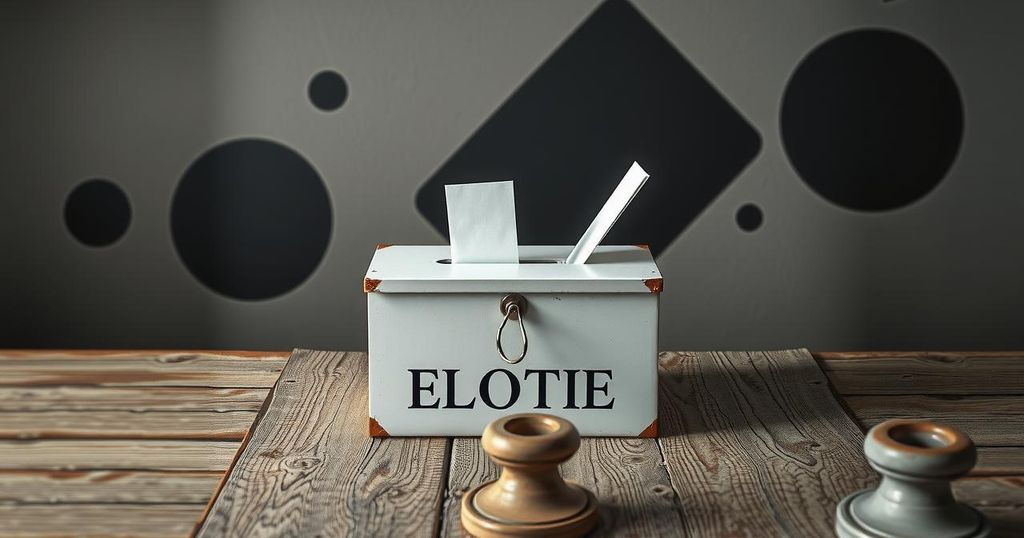Ecuador is set for a presidential runoff between incumbent Daniel Noboa and progressive candidate Luisa González, both having received approximately 44 percent of the votes in the February election. Noboa, aligned with neoliberalism and anti-immigration stances, faces a polarized electorate, while González represents social priorities reminiscent of Rafael Correa’s era. The April runoff presents challenges amid ongoing socio-economic crises.
Ecuador is headed for a presidential runoff between incumbent Daniel Noboa and progressive candidate Luisa González, scheduled for April. Both candidates emerged from a closely contested election held on February 9, 2025, where they each garnered about 44 percent of the votes. To win outright in the first round, a candidate must secure over 50 percent of the votes or at least 40 percent with a 10-point lead. Noboa previously won against González in the 2023 election.
In a complex backdrop, Noboa capitalized on the constitutional provision known as “muerte cruzada,” which allows the president to dissolve Congress and call for snap elections. Following this, he completed part of the term of former president Guillermo Lasso, who was facing impeachment. González, representing the Revolución Ciudadana party, is running for the second time, building upon the legacy of former president Rafael Correa, who led from 2007 to 2017.
This election highlighted the stark ideological divide in Ecuadorian politics, with Noboa advocating for neoliberal policies favoring austerity and privatization, while González emphasizes social funding for healthcare and education. Additionally, Noboa has aligned with U.S. President Donald Trump and other far-right leaders, reinforcing his stance on immigration issues and offering cooperation for the deportation of immigrants from the U.S.
Noboa, rooted in a wealthy family background and educated at Harvard, first entered politics in the legislature in 2021. His rise to prominence was marked by a strong debate performance in the 2023 elections, allowing him to defeat González in the subsequent runoff. Supporters of González blame current socio-economic challenges, such as drug violence and energy crises, on previous administrations.
The looming presidential runoff has also ignited discussions around drug-related violence and economic instability, which have driven many Ecuadorians to seek better opportunities abroad. Meanwhile, González’s supporters commemorate Correa’s tenure for reduced poverty and inequality, attributing the country’s current turmoil to subsequent leadership failures. The polarization in society reflects deeply entrenched partisan views and lingering resentments.
Noboa has adopted strict measures against crime, including imposing states of siege and deploying the military to manage violence, which critics decry as authoritarian. A notable scandal occurred when he arrested former Vice President Jorge Glas, currently seeking asylum in Mexico, resulting in a significant diplomatic fallout. Furthermore, Noboa’s relationship with his vice presidential candidate has been contentious, ultimately leading to the selection of a new running mate for the election.
The electoral landscape included several candidates, with the elimination of Jan Topić impacting the vote distribution. Despite Iza’s strong platform as an Indigenous representative, he only managed to secure a small share of the vote, highlighting the systemic challenges faced by minority candidates in Ecuador. Additionally, the elections also encompassed parliamentary races, further complicating the political dynamics.
Given the polarized climate, predicting the outcome of the April runoff is challenging, as neither candidate appears to offer clear solutions to pressing issues. Both Noboa and González will likely face substantial obstacles, including an unsupportive Congress and high public expectations. This election cycle reinforces the complex interplay of historical grievances, governance, and social divisions within Ecuadorian society.
As Ecuador approaches the presidential runoff between Daniel Noboa and Luisa González, voters must navigate a politically charged atmosphere characterized by stark ideological differences. Noboa’s alignment with neoliberal policies contrasts sharply with González’s advocacy for social investment. With issues such as drug violence and economic instability prevalent, the incoming administration will likely face significant challenges regardless of the outcome.
Original Source: nacla.org




